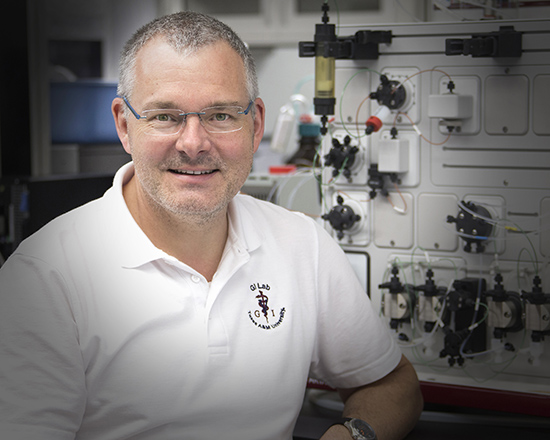CVM’s Steiner Named Among Texas A&M’s Seven 2019 University Distinguished Professors

Dr. Jörg M. Steiner, a professor in the Texas A&M College of Veterinary Medicine & Biomedical Sciences’ (CVM) Department of Small Animal Clinical Sciences (VSCS), has been awarded the highest faculty honor bestowed upon a scholar at Texas A&M University with the title of University Distinguished Professor.
The designation, conferred by a panel of past recipients, identifies faculty members who are preeminent in their fields and who have made at least one landmark contribution to their discipline, with their research and advancements considered central to any narrative of the field.
“This recognition feels fantastic, and it makes me proud on many levels. If you look at the entire list of people who have been recognized, there are people on there who have been hugely impactful not on just one segment of research but on society,” said Steiner, who also serves as the Dr. Mark Morris Chair in Small Animal Gastroenterology and Nutrition.
“The proudest thing for me is that, as far as I know, I’m the first clinical investigator who’s ever been recognized with this award,” he said. “For years and years clinician scientists we have always been sort of perceived as not really being researchers, but more as being clinicians who write a few papers here and there. To get this recognition means “yes”, clinician scientists can play a role in the field.”
A small animal and comparative gastroenterologist, Steiner came to Texas A&M in 1997 as a graduate research assistant. After earning his Ph.D. from the CVM in veterinary microbiology in 2000, he joined the faculty as a clinical assistant professor and co-director of the Gastrointestinal Laboratory. In 2005, he was named director of the GI Lab and in 2011 attained the rank of full professor.
“The work Dr. Steiner has done while at the Texas A&M College of Veterinary Medicine & Biomedical Sciences has had an immense impact on the field of veterinary gastroenterology, including the development of diagnostic tests that are run millions of times a year in laboratories around the world,” said Dr. Eleanor M. Green, the Carl B. King Dean of Veterinary Medicine at Texas A&M. “We are very proud of all that Dr. Steiner has accomplished, and the title of Distinguished Professor is one that has been well earned.”
“Dr. Steiner’s contributions to veterinary medicine, and healthcare more broadly, are outstanding,” said Dr. Jonathan Levine, department head and the Helen McWhorter Chair in VSCS. “He directs a field-leading laboratory that serves veterinarians and clients throughout the world. He is continuously and fearlessly innovating by building new diagnostic tests for prevalent diseases and exploring novel treatments for these challenging diseases. There are few other veterinarians who have helped our profession toward excellence to the extent that Dr. Steiner has.”
One of his biggest contributions to the profession, commercially, was the result of the work he did for his Ph.D. developing a diagnostic tool for pancreatitis.
“What made it very satisfying for me was that not only did we develop this assay, we commercialized it with IDEXX, and then it started a really tight collaboration with IDEXX; we helped them further develop the assay and it really became a close collaboration that has helped jumpstart many other projects,” Steiner said.
His other accomplishments, including his work with students who go on to contribute to the field, have been much more impactful to him.
“There are other discoveries that we have made that might not affect as many animals (by numbers alone) but in terms of how it changed the profession are maybe more important,” he said. “A great example is a diagnostic test we developed for exocrine pancreatic insufficiency; before there was no diagnostic test so veterinarians didn’t diagnose it. It’s one of those things that when you’re not looking for it, you don’t find it.
“We did a study in the mid ’90s and one cat per year would get diagnosed with exocrine pancreatic insufficiency and now we’re diagnosing a thousand cats with this disease every year,” he said. “That, to me, is an impact on the profession that is real.”
The six other new University Distinguished Professors inducted at a May 8 ceremony on May 8 are: Francois P. Gabbaï, Department of Chemistry, College of Science; Roger E. Howe, Department of Teaching, Learning and Culture, College of Education and Human Development; Valerie M. Hudson, Department of International Affairs, The Bush School of Government and Public Service; Richard Miles, Department of Aerospace Engineering, College of Engineering; Dorothy Shippen, Department of Biochemistry and Biophysics, College of Agriculture and Life Sciences; and Kirk O. Winemiller, Department of Wildlife and Fisheries Sciences, College of Agriculture & Life Sciences.
More information, including a complete list of University Distinguished Professors, is available online at: http://dof.tamu.edu/Awards-and-Honors/University-Distinguished-Professor.
###
For more information about the Texas A&M College of Veterinary Medicine & Biomedical Sciences, please visit our website at vetmed.tamu.edu or join us on Facebook, Instagram, and Twitter.
Contact Information: Jennifer Gauntt, Interim Director of CVM Communications, Texas A&M College of Veterinary Medicine & Biomedical Science; jgauntt@cvm.tamu.edu; 979-862-4216


